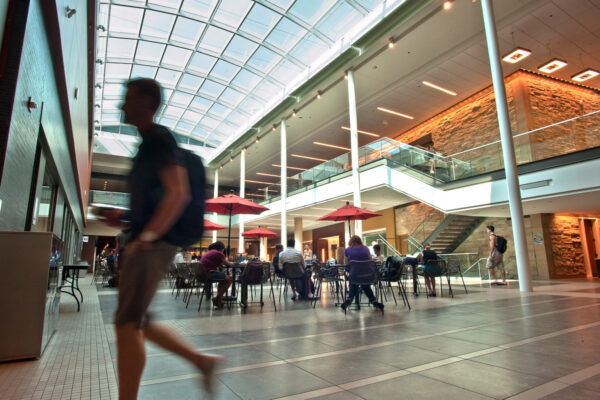Cindy Kane, a 2016–17 ACE Fellow, used her year in the program to reimagine her position at Bridgewater State University (MA)—and plan an innovative next step in her career.
“Success is a journey, not a destination.”
I have seen this quote attributed to Arthur Ashe, Ben Sweetland, and Mark Twain, as well as the motivational card that I have framed from an awards ceremony from the late 1990s. Regardless of who the true author of the sentiment may be, it is probably no accident that this quote was on my mind during the recent commencement season.
Our students are often asked, “Where do you want to be in five years?” “What kind of job are you looking for?” “Why did you pick that major?” “What do you want to do with that?”
For higher education leaders engaged in career conversations, it’s not all that different. “Where do you want to be in five years?” “What kind of job are you looking for?” “How long do you plan to stay where you are?”
I’m a planner by nature, but for some reason this notion of having your life organized in the same way you might plan the project launch of a new software platform just never sat well with me. When I was younger, I had friends who plotted out being married by 25 and having 2.9 children by 31, and set timelines for their first house, first graduate degree, and more. I never had my life mapped out to that extent because, despite how much I wanted it, I was not given that much control over the journey. I always embraced the idea that life was a combination of things that happen and things that you make happen.
Author and speaker Simon Sinek wants us to “start with why” if we want to be ready to face the challenges of leadership. My “why” for starting a career in student affairs was to be a part of offering incredible learning experiences to college students. When I began thinking about moving into a leadership role, I considered the ACE Fellows Program as a way to explore this new “why.” I’d always heard about the Program and was intrigued by the possibilities that might come with deep immersion in the experience and the broad ACE network.
While some may assume being a Fellow is a step toward a specific destination, my decision to pursue it was more about the journey. I knew I had to stop focusing on “where” I was going to work next, and needed a new frame of reference if I was going to look at my next steps in a new way.
Much like my insightful Fellows classmate Rob Deemer, who wrote in his 2017 post about being a faculty member considering a move to administration, I was a student affairs educator considering a move to . . . where? I knew more about what didn’t feel right than I knew about what was right, so it was time to make a new thing happen. After I was named as a Fellow, I made the decision to focus the journey on answering whether or not a move to academic affairs would be my next step.
Throughout this fellowship journey, I had a combination of on-campus experiences at my home institution within academic affairs as well as a semester placement in the Office of the Provost at Wheaton College (MA). I had the chance to experience a new role at my home institution as well as to experience academic leadership at a campus much different from my own. Even though I have devoted my academic study to the exploration of topics relating to leadership as well as higher education, the chance to experience daily life with the leadership team in the Office of the Provost on both campuses taught me more than I could have ever learned through reading alone. Watching the mechanics of decision making in progress and being both participant and observer in the context of both campuses quickly helped me to see what I might have to offer if I did make the move into academic affairs leadership.
Through the fellowship, while the experiences were different, my “why” stayed the same. I still wanted to focus on bringing outstanding learning experiences to students. My year as a Fellow helped me to see possibilities in student success, student affairs, academic affairs, and even association work. After gaining motivation from my 28 talented new colleagues from the self-designated “best class ever” and refreshing my knowledge on the most pressing issues facing higher education leaders, I was ready to describe the journey as immediately fulfilling and, upon reflection, as a truly transformative, inspirational opportunity for which I will always be grateful.
Back on my campus, my home institution leaders engaged with me in discussions about my return. Moving the theme forward about new approaches, we changed things up and constructed a new position that was a modification of my role in student affairs, plus a half-time role working in the Office of the Provost on academic innovation initiatives. While the simultaneous experience of the two roles in two divisions is the topic for another blog post, my year back on campus gave me the chance to reflect and decide what happens next.
I began to apply for new opportunities, but at the same time my work at my home campus was getting really interesting. I was forming new relationships through my work in academic affairs and the division’s agenda for the coming few years was becoming clear under a dynamic new provost. Not only was the work exciting, but the road ahead seemed to be a clear fit for my personal strengths as a leader. Outside opportunities were looking interesting too, so it was time to make a choice and a commitment to either leave my institution or explore new possibilities within it.
On July 1, I started a full-time role as special assistant to the provost. While I have been at my home institution for quite a long time, this new role feels both familiar and new at the same time. Whatever this role holds for me, I know that I can face it well now that I bring my years of experiences in higher education leadership, the learning from a year as an ACE Fellow with experts and sages who facilitated that learning, and my 28 new colleagues from my Fellows class who are invested in supporting my success. I couldn’t be more excited.
Who knew that you could travel the country and spend a year scouring the national landscape in higher education, just to find new challenges in your own backyard?
If you have any questions or comments about this blog post, please contact us.


